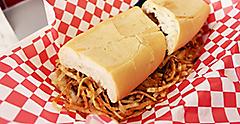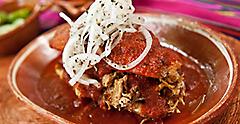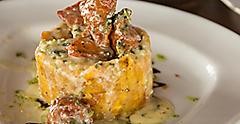Jamaican jerk is both a spice and a way of cooking that continues to enchant food lovers the world over. Sample the melting pot that is Jamaican cuisine and get ready to dive into the smoky, mouthwatering world of jerk.
What Is Jerk?
According to The Food Lover's Companion (Third Edition) by Sharon Tyler Herbst, Jamaican jerk seasoning is a dry blend of spices that's used primarily in the preparation of grilled proteins. "The ingredients can vary, depending on the cook, but Jamaican jerk blend is generally a combination of chilies, thyme, spices (such as cinnamon, ginger, allspice and cloves), garlic and onions," explains Tyler Herbst. Add to that scotch bonnet (or habanero) peppers, and you've got the popular, fiery-hot version.
Depending on who's cooking, the blend can be rubbed directly on the meat prior to cooking or blended with a liquid to create a marinade. The perennial favorites for jerk are pork and chicken, but across the island, you can find jerk fish, crab, lobster, goat, vegetables and, yes, even fruit.
Jerk is also a method of cooking. A jerked piece of food is slow-smoked on the grill over pimento wood, which is native to the Caribbean Islands. The tree also produces the distinctive pimento berry, which is the origin of the Jamaican "allspice" used in Jamaican jerk seasoning. It's reminiscent of cloves, nutmeg, pepper and cinnamon all in one!
Another interesting side note about pimento is that the word comes from the Spanish word for pepper (pimiento) because early European explorers mistook it for black pepper and the name stuck.
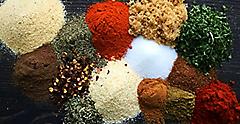
The History Behind The Seasoning
The island's original inhabitants were indigenous peoples called Arawaks or Tainos who came from South America about 2,500 years ago. They called the island Xaymaca or "land of wood and water."
The Arawak were known for preparing a type of jerky that originated in Peru and is called charqui. When preparing it, they poked holes in the meat so the spices would permeate it more thoroughly. The meat would be smoked over a slow fire or sun-dried as in Peru, and it was ideal for taking on long journeys or for adding to boiling water for flavor when preparing other dishes.
Christopher Columbus discovered the island in 1494 and subjected the people there to Spanish rule. Sadly, the Arawak population died out because of warfare and the introduction of European diseases, and African slaves became the biggest group living on the island.
In 1655, according to the Jamaica Information Service, the English invaded the Spanish, who surrendered, freeing their slaves before leaving Jamaica and retreating to Cuba. This group of runaway slaves and their descendants are called the Maroon people of Jamaica. They managed to elude British authorities by living in the mountainous interiors of the island and by cooking meals over coals or on pimento wood underground. Cooking underground only happened because they were in hiding. A positive side effect of preparing the meat this way was the succulent, juicy flavor.
By 1793, the English officially granted a tract of land to the Maroon people, and since they no longer had to hide, jerking meat switched from underground cooking to grilling. They used pimento wood sticks to hold the meat above a fire.
Today this kind of meat is enjoyed all over the island. The combination of sweet and savory aromatic spices and ingredients is a standout that you should definitely try at least once. From humble jerk huts or shacks to fine dining restaurants, you'll find the iconic dish everywhere. Here are a few versions to try on your next visit to Jamaica.

The Roadside Vendor
In Montego Bay, you'll find local favorite Scotchies, which is named after the hot pepper found in jerk seasonings. You'll smell the fragrant pimento wood burning before you see the fire grills of meat covered with corrugated metal. Go for the jerk pork, chicken, fish or sausage and grab a side of rice and peas, plantains, roasted breadfruit or festival (a fried sweet dough bread) and a cold beer. Pull up a spot at the nearby barrels that double as tables and kick back and relax in this super-casual island hot spot.
Hot tip: If you don't make it to Montego Bay, Scotchies has expanded to the north coast, too. Try the location off the highway in Ocho Rios, which has a pretty garden and covered terrace.
The Casual Eatery
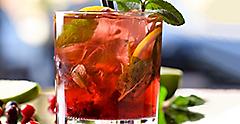
The Jerk-Based Center
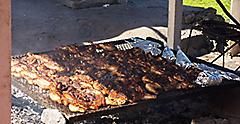
It's said that Boston Beach, a strip of coastline along what used to be called Buckley's Beach, is the birthplace of modern-day jerk. The first "Jerkmen" are said to be Isaiah Smith, Drelton Williams, Arthur Wilson, Rufus West and Sydney and James Marshall, and their jerk pit was supposedly located less than a quarter-mile east on the A road from Boston Beach.
Today, the Boston Bay Jerk Center, a rural food court and mall, cooks up a variety of jerk meats on open pits using uncured pimento wood over blazing hot coals. Corrugated zinc covers the meat until it's cooked to tender perfection. Place your order by weight — quarter, half or full pound — and if you like it spicy, get some jerk sauce on the side. You can get fresh coconut water, juice and other tasty Jamaican treats from nearby stalls, too, if you're so inclined.

The High-End Restaurant
You'll find Negril's most celebrated fine-dining destination, the Rockhouse Restaurant, overlooking volcanic cliffs set against the turquoise blue of the Caribbean Sea. The menu is what they call "a lighter, modern interpretation of Jamaica's classic dishes" with a truly local spin: Many of the fresh ingredients are picked from the property's own gardens. Start with a jerk-spiced grilled calamari, then sample a main course of jerk-grilled lobster or chicken "under a rock" with a side of jerk-pan barbecue carrots, potatoes and kale. Then finish with a pimento-spiced Dark 'n' Stormy rum cake!
If you want to bring some of that complex flavor to your home kitchen, you can add Jamaican jerk seasoning to an array of fresh proteins and produce, from mango salads and grilled veggies to jerk-laden peach hot sauce. A word of friendly advice, though: Since we don't have access to much pimento wood in North America for that coal and pimento-fired open grill, don't be too disappointed if that X-factor flavor profile is missing. It's the smokiness of the pimento as well as the Jamaican sunshine, the warmth of its people and the lush surroundings that you're likely missing most. If reggae, sun, sand and jerk are calling your name, a return trip to this special place might be in order.
Get Royal Deals, Sign Up Today

Getting There
Best Deals To Jamaica
taste Mouth Watering, Fragrant, Smoky and Spicy Jerk Chicken



